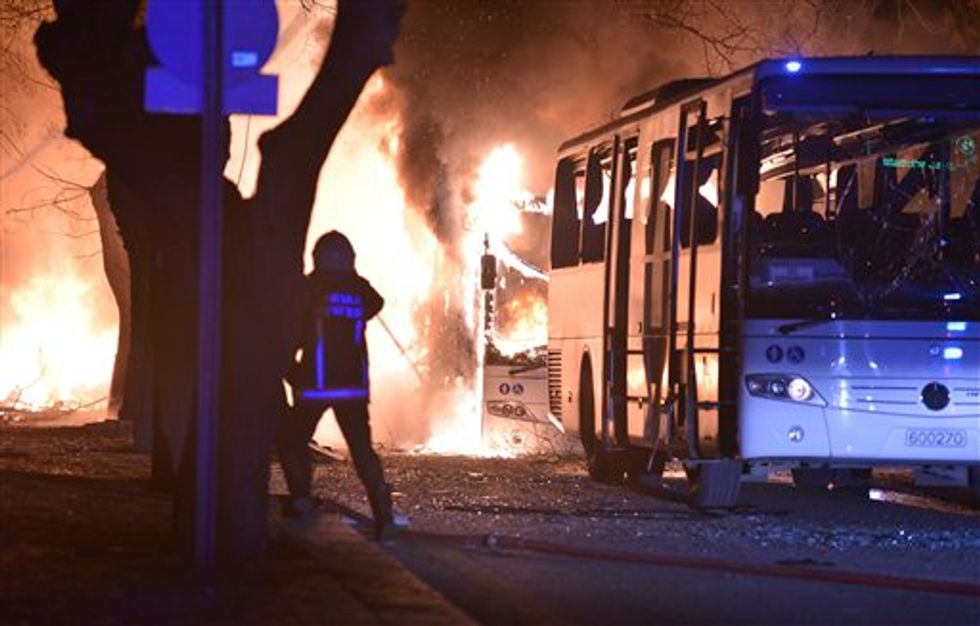ANKARA, Turkey (AP) -- Assailants on Wednesday exploded a car bomb near vehicles carrying military personnel in the Turkish capital, killing at least 18 people and wounding some 45 others, officials said.
The explosion occurred during evening rush hour in the heart of Ankara, in an area close to where military headquarters and parliament are located. Buses carrying military personnel were attacked while waiting at traffic lights at an intersection, the Turkish military said while condemning the "contemptible and dastardly" attack.
 Firefighters work at a scene of fire from an explosion in Ankara, Wednesday, Feb. 17, 2016. A large explosion, believed to have been caused by a bomb, injured several people in the Turkish capital on Wednesday, according to media reports. Private NTV said the explosion occurred during rush hour in an area close to where military headquarters are located as a bus carrying military personnel was passing by. (IHA via AP)
Firefighters work at a scene of fire from an explosion in Ankara, Wednesday, Feb. 17, 2016. A large explosion, believed to have been caused by a bomb, injured several people in the Turkish capital on Wednesday, according to media reports. Private NTV said the explosion occurred during rush hour in an area close to where military headquarters are located as a bus carrying military personnel was passing by. (IHA via AP)
Ankara governor Mehmet Kiliclar said authorities believe that the explosion was caused by a "bomb-laden vehicle."
News reports said some cars caught fire and dozens of ambulances were sent to the scene. Dark smoke could be seen billowing from a distance. At least four of the injured were military personnel, private NTV television reported.
It was not clear who was behind the bombing Wednesday. Kurdish rebels, the Islamic State group and a leftist extremist group have carried out attacks in the country recently.
In October, suicide bombings blamed on IS targeted a peace rally outside the main train station in Ankara, killing 102 people in Turkey's deadliest attack in years.
Wednesday's attack comes at a tense time when the Turkish government is facing an array of challenges. A fragile peace process with the Kurdish rebels collapsed in the summer. The Turkish security forces have been engaged in large-scale operations against Kurdish militants in the southeast since December, imposing controversial curfews in flashpoint areas, and the fighting has displaced tens of thousands of civilians.
Turkey has also been helping efforts led by the United States to combat the Islamic State group in neighboring Syria, and has faced several deadly bombings in the last year that were blamed on IS.
The Syrian war, meanwhile, is raging along Turkey's southern border. Recent airstrikes by Russian and Syrian forces have prompted tens of thousands of Syrian refugees to flee to Turkey's border. Turkey so far has refused to let them in, despite being urged to do so by the United Nations and European nations, but is sending aid to Syrian refugee camps right across the border.
Turkey, which is already home to 2.5 million Syrian refugees, has also been a key focus of European Union efforts to halt the biggest flow of refugees to the continent since World War II. Hundreds, sometimes thousands, of refugees leave every night from Turkey to cross the sea to Greece in smugglers' boats.
After the attack, Turkish Prime Minister Ahmet Davutoglu canceled a visit to Brussels Wednesday evening and attended a security meeting with President Recep Tayyip Erdogan and other officials.
The government meanwhile, imposed a gag order which bans media organizations from broadcasting or printing graphic images of the dead or injured from the scene of the explosion. Turkey has imposed similar bans after previous attacks.
Last month, 11 German tourists were killed after a suicide bomber affiliated with the IS detonated a bomb in Istanbul's historic Sultanahmet district. More than 30 people were killed in a suicide attack in the town of Suruc, near Turkey's border with Syria, in July.
–

 Firefighters work at a scene of fire from an explosion in Ankara, Wednesday, Feb. 17, 2016. A large explosion, believed to have been caused by a bomb, injured several people in the Turkish capital on Wednesday, according to media reports. Private NTV said the explosion occurred during rush hour in an area close to where military headquarters are located as a bus carrying military personnel was passing by. (IHA via AP)
Firefighters work at a scene of fire from an explosion in Ankara, Wednesday, Feb. 17, 2016. A large explosion, believed to have been caused by a bomb, injured several people in the Turkish capital on Wednesday, according to media reports. Private NTV said the explosion occurred during rush hour in an area close to where military headquarters are located as a bus carrying military personnel was passing by. (IHA via AP)


